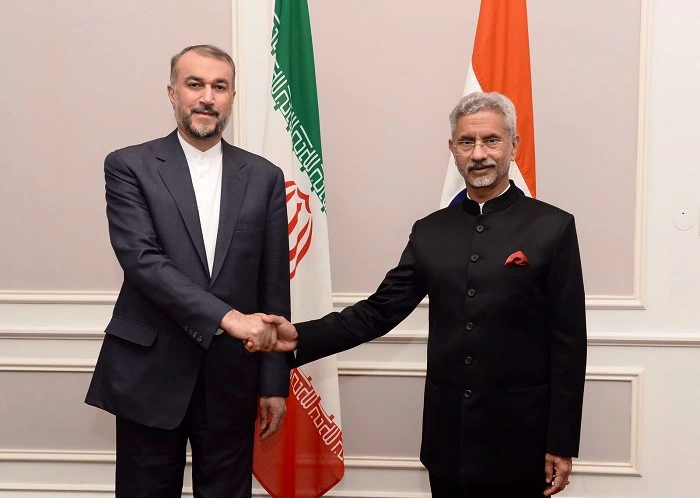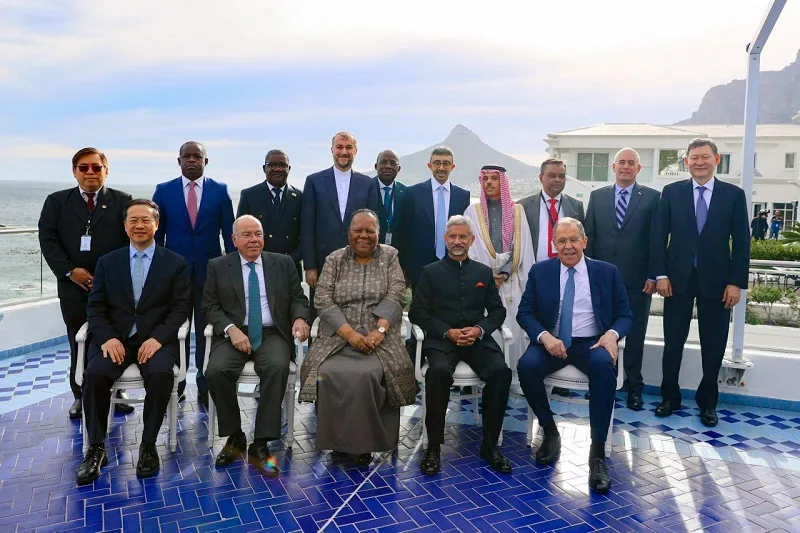

External Affairs Minister S Jaishankar with Iranian Foreign Minister Hossein Amir-Abdollahian in Cape Town on Friday (All images courtesy: Twitter/@DrSJaishankar)
India and Iran are laying the groundwork for holding a successful meeting of the Joint Economic Commission of the two countries as well as a “fruitful visit” of Iranian President Ebrahim Raisi to New Delhi in the coming months.
External Affairs Minister S Jaishankar met his Iranian counterpart Hossein Amir-Abdollahian on the sidelines of the Friends of BRICS Foreign Ministers’ meeting in Cape Town on Friday during which both ministers discussed in detail the need to remove obstacles to economic and commercial cooperation between the two countries.
“Reviewed our bilateral ties and discussed ways of strengthening them further, with particular emphasis on Chabahar port,” tweeted Jaishankar after the meeting.
Iran is anxiously looking forward to the 23rd Summit of the Shanghai Cooperation Organisation (SCO) Heads of State which will be chaired by Prime Minister Narendra Modi on July 3-4.
India assumed the rotating Chairmanship of SCO at the Samarkand Summit last September and it will be under its ongoing chairmanship that Iran – an observer state till now – is expected to get a full membership of the grouping.
In Cape Town on Friday, Abdollahian recalled his last year’s visit to New Delhi, the meeting with PM Modi and many developments that have taken place to further solidify the partnership between the two countries.


After SCO, Iran is also eagerly waiting for the BRICS expansion with Abdollahian expressing hope in his meeting with Jaishankar that the membership mechanisms of BRICS-friendly countries will be defined and implemented as soon as possible.
“The head of the diplomacy of our country described the BRICS group as a good framework for strengthening Iran’s cooperation with its members, especially India, and referring to the great economic capacities of our country, he considered Iran’s membership in BRICS as a basis for strengthening the position of BRICS and its economic capacities,” Iran’s Foreign Ministry said in a statement after the Jaishankar-Abdollahian meeting.
It added that the two ministers also discussed “some technical issues” related to Chabahar port.
India has been pushing extensively for the utilization of New Delhi-backed Chabahar port in Iran, and its inclusion in the International North-South Transport Corridor (INSTC) framework for improving the land-locked Central Asian region’s connectivity with the outside world.
New Delhi also believes that if the full potential of the Chabahar is realised, then it can not only become the gateway for Indian trade with Europe, Russia and CIS countries but also turn into one of the most important ports in the world in the near future.
The large-scale 7,200 km-long multimodal trade corridor, which will start from Mumbai with nodes in West Asia, Central Asia, Caucasia and Russia, would eventually link the far-west Russian city of Saint Petersburg to the ports of Iran and India.
However, the lack of regular shipping lines between Russia and Iran as well as between Iran and India impedes the full-scale launch of the INSTC.
It was agreed during the first meeting of the India-Central Asia Joint Working Group (JWG) on Chabahar Port held in Mumbai this April that connectivity requires the active participation of the private sector.
India, meanwhile, continues to ship humanitarian assistance for the people of Afghanistan through the Shahid Behesti Terminal at the Chabahar Port.
Since December 2018, when India Ports Global Limited (IPGL) took over operations at Chabahar through its wholly-owned subsidiary India Ports Global Chabahar Free Zone (IPGCFZ), India has utilised the port to ship a total of 2.5 million tonnes of wheat and more than 2000 tonnes of pulses to Afghanistan.
Prime Minister Narendra Modi interacted with members of the Indian diaspora here on Wednesday as…
The city of Hamburg in Germany is set to host the 11th edition of India…
The International Atomic Energy Agency (IAEA) has confirmed that two Iranian centrifuge production facilities, TESA…
The human rights department of the Baloch National Movement (BNM), Paank, has strongly condemned the…
In a major boost to India's coastal defence capabilities, the Indian Navy on Wednesday commissioned…
Volker Turk, the UN High Commissioner for Human Rights, on June 17 expressed concern over…